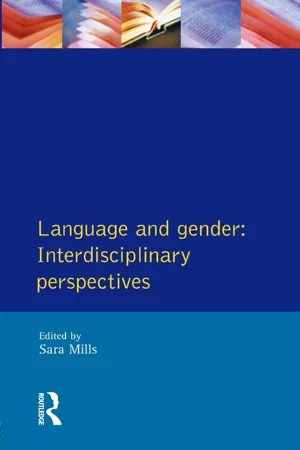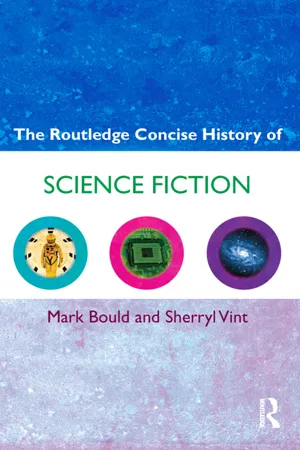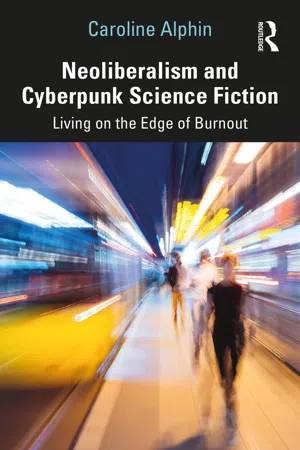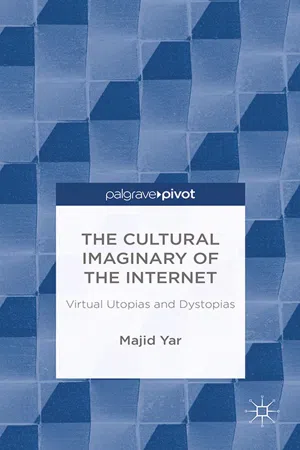Cyberpunk Literature
Cyberpunk literature is a subgenre of science fiction that emerged in the 1980s, characterized by its focus on high-tech, low-life scenarios, often set in dystopian futures. It typically features themes of advanced technology, artificial intelligence, and the impact of corporate control on society. Cyberpunk works often explore the blurred boundaries between humans and machines, and the consequences of rapid technological advancement.
4 Key excerpts on "Cyberpunk Literature"
- eBook - ePub
Language and Gender
Interdisciplinary Perspectives
- Sara Mills(Author)
- 2014(Publication Date)
- Routledge(Publisher)
...I am primarily concerned with the use of narrative structures and codes drawn from other genres in which the feminine is not marginalised, such as romance fiction, and with the rewriting of the dominant metaphors of science fiction to create a conceptual and linguistic space within which the feminine can be coded as hegemonic. The metaphor of the cyborg, and its positioning in relating to cyberpunk, provides the focus for my argument that these strategies have been profoundly disruptive for the genre as a whole because, in challenging the dominance of the masculine in discourses about technology, they challenge the constraints of both genre and gender. Although the term ‘cyberpunk’ is one that is now used to describe cultural productions across a range of media, particularly film, video and performance, it first emerged in the 1980s as a sub-genre of science fiction. Cyberpunk constitutes a major intervention into the genre, and the writer whose name remains most clearly identified with it is William Gibson, although other writers such as Bruce Sterling, Lewis Shiner, Rudy Rucker and John Shirley were equally involved in promoting the idea that cyberpunk was a ‘movement’. Cyberpunk writing combines the language of information technology with the spatial and temporal dislocation that is characteristic of science fiction. The innovative syntax of cyberpunk draws on the rhetoric of postindustrial technology to present fictional landscapes that are ironic and playful, both in their simulation of surface reality and in their apparent effacement of the boundaries between inner and outer worlds. A notable feature of cyberpunk writing is its speed and dazzle, and in his introduction to the cyberpunk anthology Mirrorshades, Bruce Sterling describes the impact of its prose as resembling the kind of ‘sensory overload’ that is ‘the literary equivalent of the hard-rock “wall of sound’” (Sterling 1988: xiii)...
- eBook - ePub
- Mark Bould, Sherryl Vint(Authors)
- 2011(Publication Date)
- Routledge(Publisher)
...However, many also criticised the conservatism of cyberpunk, particularly in its treatment of gender, sexuality, race and global inequities. Later cyberpunk articulated and answered these critiques. Simultaneously, the conservative dominance of hard SF waned. • With its wide appeal beyond traditional readerships, cyberpunk had three important legacies: an array of images, ideas and techniques with which to depict and examine a world that continues to be shaped by global capitalism and information technology; a growing interdisciplinary interest in SF among previously uninterested academic communities; and a commercial drive to market new writers and texts as innovative subgenres and movements. • Contemporary advances in science and technology and science-fictionalised cultural and critical theory prompted new explorations of embodiment, intelligence and the nature of human consciousness. • With the increased sense that reality has caught up with SF and that literary fiction has of necessity become science-fictional, the tools that the genre developed could no longer be considered its sole property....
- eBook - ePub
Neoliberalism and Cyberpunk Science Fiction
Living on the Edge of Burnout
- Caroline Alphin(Author)
- 2020(Publication Date)
- Routledge(Publisher)
...As a genre, cyberpunk can make familiar the conditions of competition, such as the marketization of space and the production of responsibilized subjectivities, via notions of amplification and cyborganization. The critical possibilities of cyberpunk emerge out of its amplification and cyborganization of the spaces of neoliberal biopolitics and corporate capitalism as it is these genre techniques that weaken the distinction between fiction and the narratives that permeate the everyday. The Affirmative Speculation of Cyberpunk Science Fiction In his essay “The Co-Existence of Cyborgs, Humachines and Environments in Postmodernity: Getting Over the End of Nature,” Timothy Luke comments on the ways science fiction makes visible the science facts of a cyborganized environment. These cyborganizing/ed sites and structures highlight the “‘environmental spaces' of transnational capitalist exchange where cyborg beings are cyborganizing/ed…” 2 For Luke, the figure of the cyborg acts as an analytic for examining the self-evident truths of late- modern liberalism: the notion of a pristine nature independent of the human/cultural/political/economic realm, the preservation of the free individual as the central goal of politics and the state, and the free market as a means of protecting the individual. As a denatured and dehumanized being, the cyborg problematizes liberalism by offering an alternative politics with different subject categories, environments, spaces, and temporalities...
- eBook - ePub
The Cultural Imaginary of the Internet
Virtual Utopias and Dystopias
- M. Yar(Author)
- 2014(Publication Date)
- Palgrave Pivot(Publisher)
...4 The Dystopian Worlds of Techno-Science Abstract: This chapter explores the dystopian cultural construction of science and technology across the discourses of social science, science fiction and popular film. This powerful language of disenchantment borrows heavily from Romantic critiques of modern society, and articulates wider cultural sensibilities about the dissolution of social order and stability in the modern world, alongside fears about the effects of technology as a force for dehumanisation and domination. Yar, Majid. T he Cultural Imaginary of the Internet: Virtual Utopias and Dystopias. Basingstoke: Palgrave Macmillan, 2014. DOI: 10.1057/9781137436696.0006. Romanticism, social science and modernity If there is a key to understanding the dystopian imaginary of techno-scientific modernity, it lies in the cultural coordinates of Romanticism. As Michael Löwy and Robert Sayre (2001) note, the term itself is notoriously difficult to define, for a number of reasons. First, it has been used to denote a wide variety of cultural discourses, spanning novels, poetry, painting, music, philosophy, history, theology, sociology, political ideology and so on. Second, the traits or characteristics identified as hallmarks of Romanticism are extremely wide-ranging (including the valorisation of imagination, nature, myth, symbol and emotions). Third, Romanticism appears to be contradictory, in that it manifests in forms: simultaneously ... revolutionary and counterrevolutionary, individualistic and communitarian, cosmopolitan and nationalist, realist and fantastic, retrograde and utopian, rebellious and melancholic, democratic and aristocratic...



